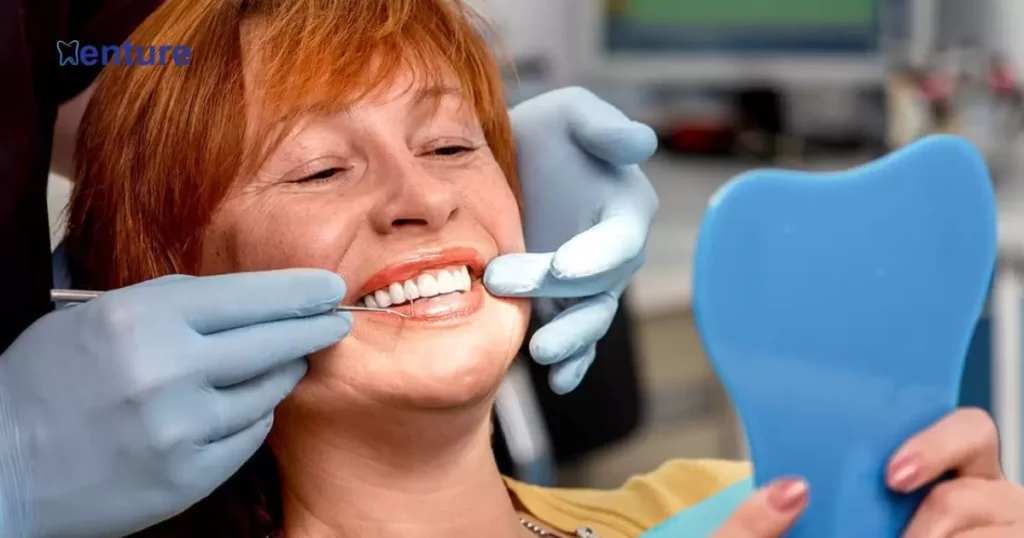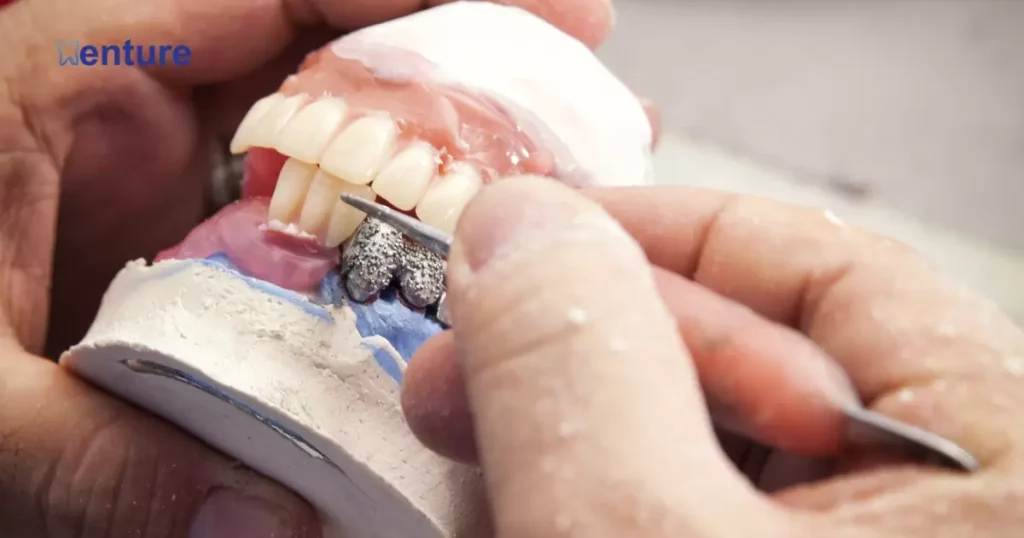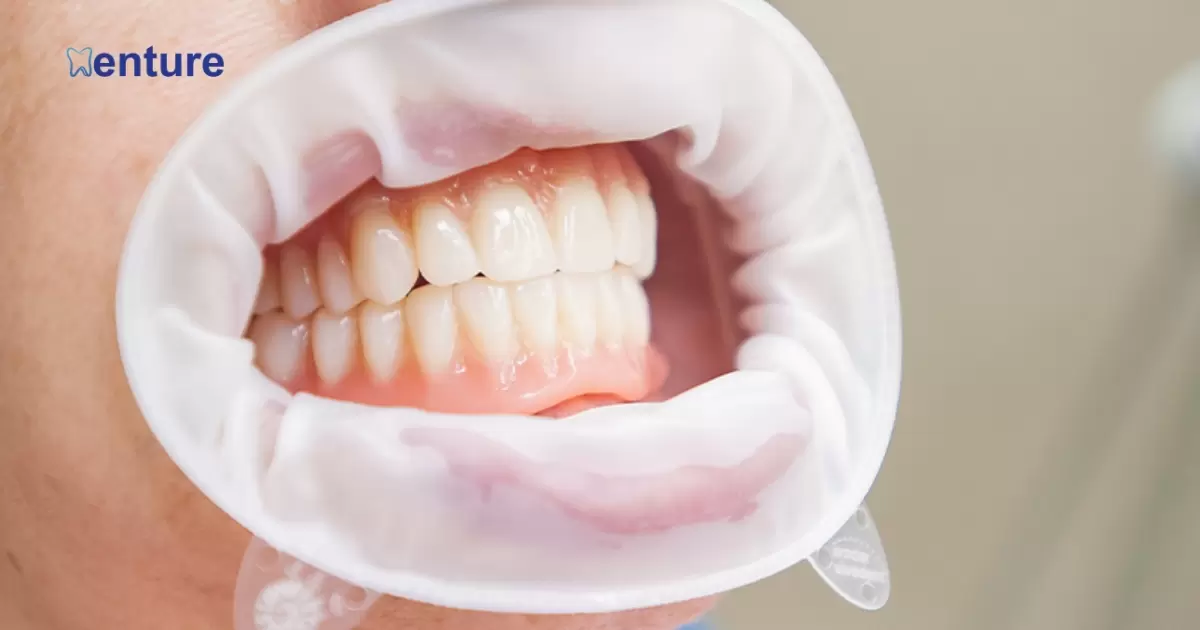Dentures are relined when they don’t fit well. This means adding new material to make them snug again. It’s like giving them a comfortable makeover. Dentists do this so you can smile and eat without worry.
For those with dentures, ensuring a comfortable fit is essential. Over time, the mouth’s shape can change, causing dentures to become loose or uncomfortable. The frequency of relining varies from person to person, and a dentist can assess and recommend the appropriate timing.
Maintaining well-fitting dentures is crucial for comfort and confidence. Denture relining, a process to ensure they fit snugly, becomes necessary as your mouth changes over time. Your dentist can determine how often this adjustment is needed based on your unique situation.
What Is Denture Relining?
Denture relining is a dental procedure that involves reshaping the inner surface of a denture to improve its fit and comfort. Dentures can become loose or uncomfortable due to a variety of factors, such as changes in the shape of the jawbone or gum tissue, wear and tear, or aging. Relining aims to address these issues by modifying the denture’s base to match the current contours of the wearer’s mouth.
| Type of Denture Relining | Description | Best Use Cases |
| Hard Denture Relining | It involves adding a new acrylic or similar material to the inside of the denture for a more permanent solution. | Recommended for long-term denture wear. |
| Soft Denture Relining | Uses soft, pliable material for a cushioning effect and is more temporary; it is recommended for comfort. | Ideal for patients experiencing sore spots or discomfort. |
Types of Denture Relining
There are two primary types of denture relining:
Hard Denture Relining: This involves adding a new acrylic or similar material to the inside of the denture to improve its fit. Hard relining is a more permanent solution and is usually recommended when the denture has been worn for an extended period.
Soft Denture Relining: Soft relining involves using a soft, pliable material to line the inside of the denture. This type of relining is often recommended when the patient experiences sore spots or discomfort. Soft relining offers a cushioning effect and is more temporary than hard relining.
What is Denture Relining and Why is it Necessary?

Denture relining, a common dental procedure, helps maintain a comfortable and secure fit for your dentures. It’s necessary because our mouths change shape over time due to factors like aging, bone resorption, or weight loss. When dentures become loose or uncomfortable, relining becomes crucial to ensure they fit snugly and provide proper functionality.
The process involves adding new material to the base of your dentures and customizing them to your mouth’s current shape. Your dentist will assess how often relining is needed based on your individual circumstances to ensure that your partial denture lasts.
Signs You Might Need a Denture Reline
When dentures become uncomfortable or start slipping, it’s a sign that a denture reline might be needed. Changes in your mouth’s shape, often due to bone loss, can cause this discomfort. Speech problems or difficulty chewing are additional signs that it’s time for an adjustment.
A well-fitting denture should feel secure and not cause sore spots. If you find that your dentures feel loose or cause irritation, it’s another clear indicator that a reline could be beneficial. Sometimes, even a clicking sound while eating or speaking can signal the need for a reline.
Hard vs Soft Relines
When it comes to denture relines, there are two main types: hard and soft. Hard relines use a rigid material that lasts longer, but they may not be as comfortable. On the other hand, soft relines use a pliable material that provides more comfort but tends to wear out faster.
Hard relines are made of a rigid material that is long-lasting. However, they might not provide the same level of comfort as soft relines. Soft relines use a more flexible material that offers increased comfort, but they tend to wear out sooner.
Soft Reline
A soft reline is a type of adjustment for dentures. It involves adding a pliable material to the base, making them more comfortable to wear. Soft relines are ideal when hard acrylic surfaces cause discomfort. Dentists can recommend this option for a better, gentler fit.
Hard Reline
A hard reline is a solution when your dentures need significant adjustments. It involves replacing the entire fitting surface with a more durable material. This ensures a longer-lasting, comfortable fit.
The Denture Relining Process
The denture relining process begins with a visit to your dentist. They will examine your dentures and the fit to determine if relining is necessary.
If it’s needed, the dentist will take an impression of your mouth. This impression serves as a mold for the new material that will be added to your dentures. Once the relining material sets, your dentures will fit comfortably, and you can confidently go about your day with a natural smile.
DIY Denture Relining Kits
While it’s always recommended to have denture relining performed by a professional, there are over-the-counter denture relining kits available for temporary relief in between dental visits. These kits are designed for short-term fixes and may not provide a long-lasting solution.
How Much Do Denture Relines Cost?
The expenses can vary because denture repair treatments are not all created equal. Since most dentures only last between 10 and 15 years on average, you will eventually need to replace or repair your dentures. Repairs for dentures may include:
- Fixing A Part Of The Denture Or The Entire Framework
- Fixing A Single Tooth
- Fixing Multiple Teeth On The Denture
There are numerous ways to break your denture, such as biting onto something too hard or dropping it on the ground. Dentures that fit poorly may potentially break and throw off the harmony of your bite.
The damaged acrylic in your denture will typically need to be replaced when it is corrected. Accordingly, denture repair will typically cost between $100 and $500, depending on what your dentist charges.
Denture repair typically costs between $100 and $500, whereas relining incurs slightly higher costs of between $200 and $900. You can prolong the life of your dentures by taking proper care of them, although they won’t last forever. Consider having your dentures relined and fixed as an investment in a contented,
First Denture Reline

The first denture reline is a notable moment for many. Typically, it occurs within the first year of getting your dentures. Your dentist evaluates how they fit and adjusts them for comfort. This initial reline ensures a better fit and helps you adapt to wearing dentures with ease.
During your first denture reline, your dentist carefully assesses the fit of your dentures, making sure they are comfortable. They may add or remove material as needed to ensure proper relining dentures and help you get used to your new smile.
Frequently Asked Question
What are the signs that my dentures need relining?
If your dentures become loose, uncomfortable, or cause sore spots, it’s time for a reline.
Can I reline dentures at home?
Home relining kits are available, but it’s best to have a professional dentist reline your dentures for the most accurate results.
Do immediate dentures require relining?
Yes, immediate dentures often need a reline after the healing process, as your mouth changes.
Conclusion
Denture relining plays a crucial role in maintaining a comfortable and worry-free experience for denture wearers. Your dentist should be consulted every 2-3 years to assess and adjust the fit, ensuring your dentures remain snug. Signs of discomfort, looseness, or sore spots are clear indicators that it’s time for a reline.
While DIY kits exist, it’s best to have a professional handle the reline of your dentures to ensure accuracy. Immediate dentures may also require relining after the healing process as your mouth changes, so seeking the expertise of a dental specialist for Dentures Be Relined is advisable.











